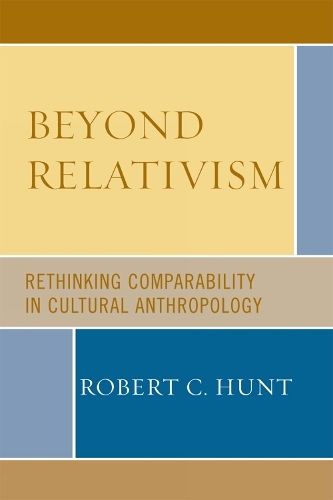
Beyond Relativism: Comparability in Cultural Anthropology
(Paperback)
Publishing Details
Beyond Relativism: Comparability in Cultural Anthropology
By (Author) Robert C. Hunt
AltaMira Press
AltaMira Press
14th March 2007
United States
Classifications
General
Non Fiction
306
Physical Properties
Paperback
200
Width 155mm, Height 229mm, Spine 12mm
299g
Description
Can elements of one culturekinship relations, for examplebe profitably compared to similar elements in other cultures According to much anthropological thinking of recent decades, the answer is "no." Cultures are closed systems, many people argue, and their internal elements can only be understood with respect to the culture as a whole. Cultural anthropologist Robert C. Hunt, drawing on his vast experience studying cultures around the world, here makes a powerful counter-argument that the various elements making up a culture not only can but must be compared across cultures if we are to understand them at all. Cultural comparison is not easy, and it cannot eliminate all ambiguity, but it is necessary if we are to develop a scientific understanding of how cultures work. This intriguing polemic will appeal to students of cultural anthropology, sociology, and ethnic studies, especially those interested in the theoretical grounding of these disciplines.
Reviews
Hunt's book should be read by all anthropologists and other researchers using cross-cultural data. He side-steps phony debates, discarding the "essentialist" rhetoric ("East vs. West," "indigenous vs. foreign,"etc.) that is so precious to poseurs in both academic and political milieus. He uses clear examples to explain how the natural sciences have been constructed step by step, century by century. He shows how this construction, of necessity, requires that we compare apples and oranges - that is, objects (and events) which are both similar and dissimilar in important ways. He demonstrates how the social sciences have necessarily followed the same path and have approached, to varying degrees in different domains, the construction of valid and comparative analytic frameworks. This book is particularly appropriate for intermediate and advanced classes on "methods" (meaning, in fact, on research design). -- Donald Attwood, McGill University
One of the main arguments for the contention that a scientific cultural anthropology is not possible is that cultures are incommensurable. In this impressive volume Robert Hunt convincingly argues that cultures are not incommensurable, and he explicates amethod by which valid cultural comparison can be and has been achieved. On both accounts he has clearly demonstrated that if a scientific cultural anthropology is not possible, it cannot be because of cultural incommensurability.... -- Melford Spiro
Summing Up: Recommended. Graduate students/faculty. * Choice Reviews *
Robert Hunt's Beyond Relativism addresses an issue of extreme importance to all of the sciences - How do we compare widely divergent theories and paradigms Hunt paves the way for researchers to render seemingly incommensurable theories into comparable theories that can be evaluated. Hunt's hopeful book should be required reading for anyone interested in advancing science instead of simply rehashing old debates. -- Lawrence A. Kuznar, Indiana University - Purdue University, Fort Wayne
One of the main arguments for the contention that a scientific cultural anthropology is not possible is that cultures are incommensurable. In this impressive volume Robert Hunt convincingly argues that cultures are not incommensurable, and he explicates a method by which valid cultural comparison can be and has been achieved. On both accounts he has clearly
demonstrated that if a scientific cultural anthropology is not possible, it cannot be because of cultural incommensurability.
The book is clearly written, and chapters go through a variety of arguments intended to clarify Hunt's main points. * Journal Of The Royal Anthropological Institute *
Author Bio
Robert C. Hunt is Professor of Anthropology at Brandeis University.
